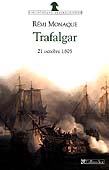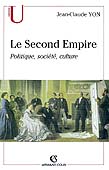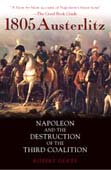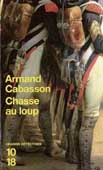| |
| |
FONDATION NAPOLEON GRAND PRIX 2005
For 2005, the annual prizes which the Fondation Napoléon gives out for historical works on the two French empires have been awarded to the the following authors:

|
|
|
| |
Admiral Rémi Monaque, Trafalgar, 21 octobre 1805, by Editions Tallandier
In this book, Admiral Monaque sets out clearly and rigorously the political and naval context in which the confrontation of the Franco-Spanish and British fleets off Cape Trafalgar took place on 21 October, 1805. The author then gives an account of the battle in which eyewitness accounts form a counterpoint to his analysis of the battle. For Napoleon and his Spanish ally, Trafalgar was complete setback: more than 4,500 dead, 2,500 wounded, and 23 ships lost. British losses amounted to a mere 450 dead, (one of which the celebrated commander Admiral Horatio Nelson), 1,200 wounded and no ships lost.
This is a complete study of the battle, and it includes many tables and frequent eyewitness accounts, not to mention maps and a plan of the battle.

|
|
|
| |
SECOND EMPIRE PRIZE 2005
Jean-Claude Yon, Le Second Empire. Politique, société, culture, Editions Armand Colin
In France, the Second Empire (1851-1870) has long suffered from a bad reputation. For decades, all that was remembered from the reign of Napoleon III was the coup d'État of 2 December, 1851, “affairisme” (insider dealing), the frivolous “fête impériale” and the disaster of Sedan. The present work is neither an attempt to rehabilitate the Second Empire, nor to criticise it. It is a magisterial synthesis which, through its emphasis on the richness and diversity of the period, gives a vivid portrait of the whole epoch rather than simply of the regime from which it is known. The twenty-year period which forms the subject of the book is looked at through three different prisms, namely, through the political history of the regime, through French society under Napoleon III, and through the broad ranging cultural history of the period.

|
|
|
| |
PRIZE FOR A BOOK IN A LANUGUAGE OTHER THAN FRENCH 2005
Robert Goetz, 1805: Austerlitz. Napoleon and the destruction of the Third Coalition, London: Greenhill Books
Tracing the historical route from Amiens to Pressburg, Robert Goetz gives even non-military historians a clear and measured view of the battle. His bibliography is detailed in French, German- and Russian- language source material (as befits a specialist of the Russian Army), and the books includes orders of battle, detailed maps, tables and many illustrations. With an explicit concentration on Prussian and Russian sources, this is a carefully argued and fascinating account of the battle.

|
|
|
| |
PRIZE FOR A WORK OF FRENCH FICTION 2005
Armand Cabasson, Chasse au loup, Editions 10/18
In 1809, the Grande Armée returns to Austria, this time to Aspern. The young lieutenant Relmyer, of Austrian origin, returns to the place where four years earlier he was kidnapped with one of his companions from their orphanage days, Franz. The latter was found dead with a macabre smile cut into his face. Relmyer swore to find the culprit… When an orphan's body is found on the battlefield, Captain Quentin Margont, accompanied as usual by his companions Lefine, Piquebois and Saber, decides to help Relmyer in his investigation. In Aspern forest, the wolf is still at large…
Here in this second novel, Cabasson gives another helping of all that was enjoyed in his first outing with our hero (La proie de l'officier). The style is very much his own, the pace is well regulated and the characters are all nicely drawn.

|
|
|
| |
RESEARCH GRANTS for students beginning PhDs on First or Second Empire subjects are also awarded. This year the following research projects were supported:
First Empire
- Christina Egli, Jean-Antoine Laurent (1763-1832), painter (troubadour), Supervisor: Professor Pascal Griener, Université de Neufchâtel
- Irène Perret, Art criticism during the Consulate and the First Empire, Supervisor: Professor Bruno Foucart, Université de Paris-Sorbonne
- David Rouanet, Foreign prisoners of war in north-eastern France (1803-1815), Supervisor: Professor Jacques-Olivier Boudon, Université de Paris IV
Second Empire
- Matthieu Brejon de Lavergnée, The society of Saint-Vincent-de-Paul in Paris during the 19th century: prosopography of a fervent Catholic elite, Supervisor: Professor Jacques-Olivier Boudon, Université de Paris IV
First-Second Empire
- Ahmed Bouyerdene, The Emir Abd el-Kader, Islam and France, Supervisor: Professor Christian Sorrel, Université de Savoie
- Sylvain Cordier, The Bellangé family, furniture- and cabinet-makers, Supervisor: Professor Bruno Foucart, Université de Paris IV
The Grands Prix and Research Grants were awarded on 6 December, 2005, at a very pleasant lunch in the presence of HIH, the Princess Napoléon.
For further information regarding the Fondation Napoléon Grands Prix and Research Grants, write to us.
Interested in the work of the Fondation Napoléon? Why not participate, either generally or in a specific project, by making a donation.
© this Napoleon.org weekly bulletin is published by the Fondation Napoléon. Reproduction or all or part of this bulletin is forbidden, without prior agreement of the Fondation Napoléon.

|
|
|
|
|
|
|
|
The Fondation Napoléon Grands Prix, the fruit of the generosity of the industrialist, Martial Lapeyre, are awarded by a jury composed of the following specialists:
• Baron Gourgaud (president),
• Jean-Claude Lachnitt (Secretary general),
• Anne Muratori-Philip,
• Professor Jean Tulard, of the Institut,
• Jean Favier, of the Institut,
• Gabriel de Broglie, of the Académie Française,
• Jean-Marie Rouart, of the Académie Française,
• Professor Jacques-Olivier Boudon, president of the Institut Napoléon,
• Professor François Crouzet,
• Professor Bruno Foucart,
• Jacques Jourquin, vice-president of the Institut Napoléon abd director-chief editor of the Revue du Souvenir napoléonien,
• Colonel Paul Willing.
Four Grands Prix, each of 8,000 Euros, are awarded. Of these four prize-winners, the jury then chooses the overall winner, the “Grand Prix de la Fondation Napoléon”, awarding a further 7,000 Euros.
=> click here to discover the previous winners.
Furthermore, the same jury awards awards six research grants worth 7,600 Euros to six French or non-French students in the first year of their PhD (or MPhil intending to go on to PhD) on First or Second Empire subjects.
=> click here for the previous research grant winners.
<<
|
|




